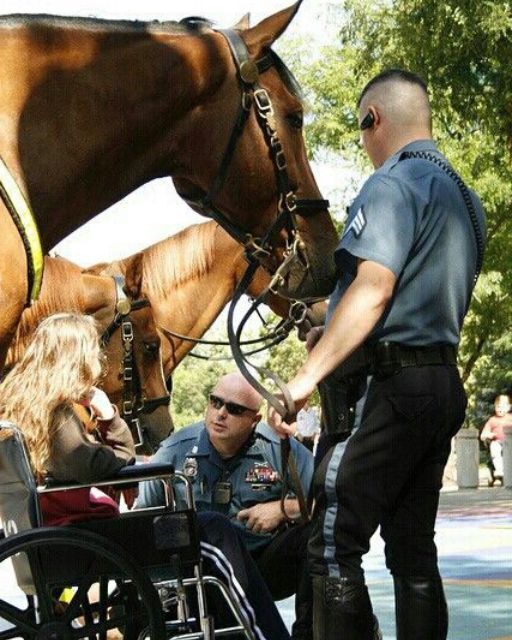SHE ROLLED UP TO THE HORSE—THEN SAID SOMETHING THAT MADE THE OFFICER FREEZE

The mounted officers had stopped briefly in the park, giving the community a rare chance to get up close to the horses. Children laughed, parents snapped photos, and for a fleeting moment, the job didn’t feel like duty—it felt like a bridge between people. Warm light from the setting sun filtered through the trees, casting a golden glow over the gathering. It was one of those gentle moments that felt like the world was pausing to breathe.
And then she appeared.
A young girl in a wheelchair, wide-eyed and silent, watching from a distance. Her mother stood behind her, protective and quiet, as if shielding a fragile hope. The girl’s gaze was fixed on one of the horses—a towering chestnut mare with a shimmering coat named Luna. The way the girl leaned forward, without even moving, gave the sense that she was being pulled toward the animal by something more than curiosity.
One of the officers—Martinez, or just Mart to most—noticed her immediately. He crouched beside her and smiled warmly. “Would you like to pet her?” he asked, gesturing toward Luna.
The girl reached out slowly, her fingers trembling slightly as they brushed the horse’s soft muzzle. A smile broke across her face—but there was something else in her eyes. Not joy exactly. Something deeper. Something like recognition.
Then came the whisper.
“Luna,” she said, barely audible. And then, her voice even softer, she added, “You’re supposed to find me.”
Mart froze.
His smile faltered, just slightly. Not out of fear, but confusion. Surprise. Her words had struck something—something strange and unexplainable. He leaned in a bit. “What did you say, sweetheart?”
The girl looked up, her dark eyes filled with a strange mix of sadness and certainty. “I saw her. In my dream last night. And you were there too. You told me not to give up.”
Mart didn’t know how to respond. The way she spoke didn’t sound like a game or imagination. It sounded… real. Too real. She hadn’t just guessed the horse’s name. She’d said it like she knew her.
Her mother, clearly flustered, stepped in. “I’m sorry. She’s very imaginative,” she said quietly. “It’s been a rough few months.”
“No need to apologize,” Mart said, eyes still on the girl. “What’s your name?”
“Maya,” the girl replied. “And I promise I’m not lying.”
That name triggered something in Mart’s mind. He remembered a dispatch call from earlier that week—social services had flagged a case. A child named Maya. Wheelchair-bound after an accident. Emotionally at risk. Her mother had reported no physical disappearance, but there were concerns she might try to harm herself or run away.
He didn’t say anything about the report. He just knelt there, listening.
Maya continued, “In my dream, I was running. Not in the chair. Running, like I used to. And Luna was with me. And you told me that no matter how bad it felt, I shouldn’t give up. You said I was going to help people.”
Mart felt something shift in his chest. He wasn’t a man given to fantasy, but her words carried a weight he couldn’t deny.
A fellow officer called for them to move on, snapping him out of the moment. But Mart didn’t leave before asking Maya’s mother if they could exchange numbers. “I’d like to keep in touch,” he said.
And he did.
Over the following weeks, Mart visited Maya often. At first, he told himself it was part of protocol—a wellness check. But deep down, he knew better. Maya reminded him of someone. Of his own daughter, who had passed away years ago. There was something about Maya’s quiet resilience, her belief in something bigger than pain, that struck a chord.
Then one day, Mart received a text that changed everything.
There had been a terrible car crash. One vehicle had overturned and caught fire. Emergency responders were scrambling. A child was missing—an eight-year-old boy who witnesses said had wandered off moments before the collision.
Mart was about to assist in the field search when his phone buzzed again. It was Maya’s mother.
“Please call. Maya had another dream.”
Mart didn’t hesitate. He stepped aside and called. Maya’s mother sounded breathless. “She said the boy’s alive. She saw him in a barn two miles east of the accident. Please, Mart. She’s never been this sure.”
He paused. Chasing the dream of a child wasn’t exactly standard procedure. But this wasn’t about procedure anymore.
He followed her directions.
Twenty minutes later, Mart stood outside a decrepit barn, surrounded by weeds and silence. He called out, flashlight sweeping through dust and shadow. And then—he heard it.
A faint, frightened whimper.
The boy was there. Alive. Cold and terrified, but safe.
The rescue made headlines. The department called it a miracle. Mart called it Maya.
He visited her again, this time not out of duty, but gratitude. “You saved him,” he told her.
Maya only smiled. “It’s not just me. I think sometimes… we’re just messengers. We’re supposed to help when we can.”
Her words stayed with him long after the visit. That same year, inspired by Maya, the department launched a new outreach program pairing therapy animals with children in recovery. Luna became the face of it—visiting schools, hospitals, and homes, bringing comfort and calm. Maya was there too, each time smiling, each time a little stronger.
She kept dreaming.
Sometimes she was right. Sometimes not. But that wasn’t the point.
The point was: she believed. And because she did, others did too.
Sometimes, the biggest miracles aren’t lightning bolts or headlines. Sometimes, they’re soft whispers. A name spoken through tears. A dream shared with someone who chooses to listen.
If this story moved you, please share it. Let’s remind one another that the world is still full of quiet magic—and that sometimes, believing is the most powerful thing we can do. 🐴✨